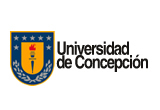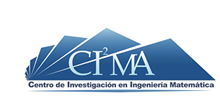News
On his 60th birthday, a group of former students organized a scientific event around the figure and career of the UdeC academic
From France, where he is currently on a sabbatical soon to end, Dr. Mauricio Sepúlveda Cortés referred to the event entitled 'MASC+: Major Advances in numerical Schemes for Conservation laws + other topics', organized around his research trajectory by a group of specialists who once received the guidance of the prominent scientist.
Mathematical Civil Engineer from the Universidad de Chile and Doctor of Science from the École Polytechnique (Paris, France), currently, Sepúlveda is Full Professor of the Department of Mathematical Engineering (DIM) of the Faculty of Physical and Mathematical Sciences of the Universidad de Concepción, UdeC, where he is also a member of the Center for Research in Mathematical Engineering, CI²MA, in addition to being an associate researcher at the Center for Mathematical Modeling (CMM) of the U. de Chile, where he is part of the group of specialists in Numerical Analysis of Partial Differential Equations (NA of EDPs).
In this regard, the Director of CI²MA and a colleague of Prof. Sepúlveda at UdeC and associate researcher at CMM, Dr. Rodolfo Araya Durán, stated that “Dr. Sepúlveda's great career is reflected in the affection and respect he generates among their students and among their colleagues from CI²MA and DIM. I can only wish him a happy birthday and that his valuable contribution continues to deepen in our University”.
 'MASC+' will be held between Wednesday 06 and Friday 08 September at the Nevados de Chillán hotel (Pinto, Ñuble Region) and is organized by three former students of Prof. Sepúlveda, two of whom are currently academics at the Faculty of Sciences of the University of Bío-Bío (UBB): Dr. Aníbal Coronel Pérez (Department of Basic Sciences) and Dr. Verónica Anaya Domínguez (Department of Mathematics).
'MASC+' will be held between Wednesday 06 and Friday 08 September at the Nevados de Chillán hotel (Pinto, Ñuble Region) and is organized by three former students of Prof. Sepúlveda, two of whom are currently academics at the Faculty of Sciences of the University of Bío-Bío (UBB): Dr. Aníbal Coronel Pérez (Department of Basic Sciences) and Dr. Verónica Anaya Domínguez (Department of Mathematics).
Meanwhile, the third of the organizers is Dr. Rodrigo Véjar Asem, academic from the Department of Mathematics of the Faculty of Sciences of the U. de La Serena. All of them obtained the highest academic degree in the UdeC Doctoral Program in Applied Sciences with a mention in Mathematical Engineering, in 2004, 2011 and 2019, respectively.
The latter commented that “first, I was his student in the Functional Analysis course of the doctorate. It didn't get so annoying, but I think it was because he took the time to answer what I was asking. I often went to his office to help me with the doubts I had. Since I am not a trained mathematician, it was difficult for me to keep up with my colleagues” and “when the time came to choose thesis work, Mauricio had the topics closest to my area of expertise (...); he is a person who knows a lot of mathematics and is a good mathematician. So much so that to this day I try to take advantage of it. He has also ventured to apply his knowledge to other areas of knowledge such as biology or physics. In this sense, I think he is a very complete person intellectually" and personally, he affirms that he "has been with me in several more or less complex situations, both academic and non-academic, which I will not forget.
For her part, Prof. Verónica Anaya highlighted that "participating in the organization of this event is a way of showing my gratitude and appreciation to Prof. Mauricio for his guidance and support in my PhD studies, as well as recognizing his academic career." and adds that he is “a patient, empathetic person. He is always available to solve doubts, and support in whatever one needs”.
And Aníbal Coronel performs a similar analysis. “When entering the doctorate, I was interested in the topic of Finite Volumes, being him at that time the only academic in the doctoral program, who carried out research in this area. So, I participated in an elective course that he taught and in the development of this course, we began to talk about possible topics to develop in a future doctoral thesis”.
“One of the first qualities that caught my attention”, details the academic at UBB, “was his serenity, as well as his willingness to attend to my queries and concerns, no matter how basic they were”.
“A second quality of Mauricio is his leadership, (...) I would like to highlight that, since he observed my interest in the subject, he invited me to participate in the seminars and talks that he was invited to develop. Later, when he observed that I had developed enough maturity, he invited me to participate in the projects that were under his responsibility. It is in this context where I learned how to develop scientific research in the area”.
Professor Sepúlveda acknowledges that the organization of this event took him by surprise, but he values it enormously, especially, “coming from ex-students, today very productive and independent colleagues, who have seen how they have been formed and evolved, forming their own network academic and scientific, as well as being people that I appreciate very much. It's very flattering”, he says.
The researcher has permanently stood out for his scientific productivity, always positioning himself at the forefront in the national ranking prepared by the National Agency for Research and Development, ANID (DataCiencia), and, in this regard, he maintains that “there is no formula, just work hard , take advantage of the ability and love for mathematics and what has been learned from the experience, such as the importance of setting goals and focusing on work”.
Mentors and trajectory
 The scientist explains that he discovered his passion for this area of knowledge very early. “I knew from high school that I wanted to study something with mathematics, but I still wasn't sure if I wanted to dedicate myself to it in a more applied way as an engineer or more of a scientist in academia”. Over time, things took their own way and he ended up receiving a doctorate in this area of knowledge.
The scientist explains that he discovered his passion for this area of knowledge very early. “I knew from high school that I wanted to study something with mathematics, but I still wasn't sure if I wanted to dedicate myself to it in a more applied way as an engineer or more of a scientist in academia”. Over time, things took their own way and he ended up receiving a doctorate in this area of knowledge.
“From a point of view of gratitude”, affirms Dr. Sepúlveda, “from people who have gone through my academic life, when I entered the University of Chile in '81, the first professor I had was Eduardo Engel, a great person and great mathematician, who later dedicated himself to economics, but motivated me with algebra and reinforced the fact of studying a mathematics career; and later in my degree, the one who seduced me academically was Carlos Conca, with whom I later did my bachelor's thesis”.
“Thanks to Carlos Conca”, he adds, “I got a scholarship to study in France, I was very motivated, and in that sense, Carlos' help was essential. There, I personally met many professors who, in Chile, we had as references for their books, eminences that I also appreciated very much because, at some point in my career, I felt their support. I am referring in particular to François Murat, Pierre-Arnaud Raviart, Jean-Claude Nedelec, among others”.
During his postdoctoral stay at the University of Heidelberg, Professor Sepúlveda met Gabriel N. Gatica, then director of the Department of Mathematical Engineering at the UdeC, in Germany, who was visiting the University of Stuttgart. Professor Gatica first invited him to participate in a Franco-Chilean congress on the specialty in Concepción (1995) and then told him that there was an open competition at the UdeC.
“I found that once it was a good place and although, in principle, I wanted to return to Santiago, it seemed to me that it was a good offer and, when I saw the University of Concepción, I really liked it, I found it very beautiful and I already knew that the numerical analysis team -which was my specialty- was quite strong here in Concepción”
Later, in a process of natural growth, would come the formation of basic projects and the award of financing for instances such as the CMM of the U. de Chile and the CI²MA of the UdeC, “led by Gabriel Gatica and we accompanied him as founders of the center”.
For him, belonging to these research groups has been "a very good, interesting experience, knowing that one is in a strong group of numerical analysis gives the opportunity to train people through a doctorate, as well as memoirists in the Mathematical Civil Engineering career and, through visiting professors and the opportunity to have postdocs, CI²MA is essentially formed as a training and research center”.
Projections and the frontier of knowledge
“Time passes quickly”, he ponders, “when you do what you are passionate about” and adds “I feel that I still have a lot to do”.
It is precisely in this search for new challenges that this year he decided to move to the Laboratory of Applied Mathematics and Informatics (MaIAGE) of INRAE de Jouy in Josas, a research center of the Université Paris-Saclay (France) where he has collaborated with Beatrice Laroche. , Romain Yvinec and Frédérique Clément in the framework of the Anaconda-Inria project “in various models on which we apply inverse problems in a new laboratory essentially for biology, but which has an applied mathematics unit in which I am collaborating”.
The models on which he has been working at the INRAE de Jouy in Josas are related, for example, “to the formation of cells in the small intestine, which follows a population dynamic, related to partial differential equations" and, with another group French research group of INRIA-Saclay and INRAE Val de Loire, has collaborated in the study of "a model of oogenesis in fish, on the one hand, and, on the other, of adipocytes related to the evolution of adipose cells s in mammals, which are also population dynamics equations in which I am interested in the inverse problems associated with them”.

